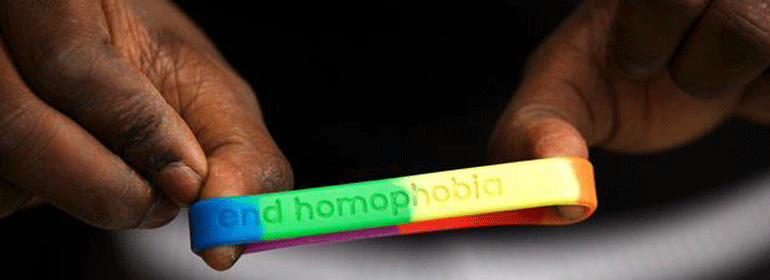As PSNI figures show an alarming increase in homophobic and transphobic crime in Northern Ireland, Rob Buchanan says cross-border solidarity is the way forward.
Figures released this week by the PSNI show a welcome decrease in sectarian-motivated incidences in Northern Ireland. However there has been a worrying increase in almost every other variety of hate-crime, including homophobic and transphobic attacks.
The main headline-grabbing incidents tend to be racist attacks on homes and the forced eviction of families from flashpoint areas. Homophobic hate-crime is largely ignored despite the devastating effects it has on the lives of victims and the chilling effect it can have on the LGBT community’s confidence as a whole.
Belfast has a uniquely split personality when it comes to acceptance of gays. There is a strong and vibrant gay scene in the city, with arguably more visibilty and concentration than Dublin. There are recognisable areas where LGBT business has been a source of regeneration and, dare I say it, gentrification. Yet, unlike in Dublin, where there is a broadly tolerant and safe feel to the city, there are distinct fault lines across areas in the city, beyond which LGBT visibility is not so welcome.
It would be unfair and inaccurate, though, to paint the LGBT community in Northern Ireland as besieged or embattled, but there is statistical evidence that queers are suffering from a different variety of oppression than their compatriots to the south.
PSNI statistics which used comparative figures between 2012/13 and 2013/14 showed the following concerning increases in anti-LGBT hate-crime:
• 280 homophobic incidents (an increase of 34).
• 179 homophobic crimes (an increase of 30).
• 23 transphobic incidents (an increase of 8).
• 8 transphobic crimes (an increase of 2).
• Homophobic incidents across the board have increased each year since the 2006/7 sampling.
Sadly, it appears that these figures don’t even show the whole story. A study by the Northern Ireland Equality Commission last year stated that 80% of homophobic crime is not reported. This is due in part to a culture of silence and to a lack of trust in authorities. Also there is a fear of retribution for any charges or action taken.
According to the same PSNI report, 44% of the LGBT community were “not aware of the way that the law can help protect them against intolerance and discrimination”. Tellingly, as seems to be the trend across the spectrum of homophobic attacks and abuse, the highest severity of harassment was directed to trans people.
It would be extremely naive of anyone to say they are surprised that this type of violence is swept under the carpet in the North. One of the unhealthiest traditions of the province has always been stoic silence in the face of brutality. But whilst in the past a lot of that silence had its roots in self-preservation, it is absolutely vital that LGBT people do not remain voiceless victims of hate crimes.
One of the huge obstacles faced by LGBT people in Northern Ireland is the prevalence of religious involvement in all aspects of society. Whilst in the Republic practically all the major parties (with admittedly various levels of sincerity) are lining up to court the gay vote or at least represent themselves as progressive, it is almost the exact opposite with some of the loyalist leaning parties in the North. Fundamentalist interpretations of the Bible and a strong conservative powerbase mean that even those with progressive leanings within parties do well to remain silent.
While I would not suggest for a moment that Unionist elements have the monopoly on homophobia, it seems in the political arena and highly influential Free Presbyterian Church, they are among the most vocal.
But there is hope on the horizon, at least on the religious front. Canon Charles Kenny stated his desire to reach out to LGBT people and voiced his despair that “homophobia is the new sectarianism in Northern Ireland”. With his views being echoed by several other more moderate church leaders, there is clearly an appetite at least for change in the public images of both denominations. The Church of Ireland Bishop of Cork, Dr Paul Colton’s comments, saying he is hopeful that his denomination will soon recognise same-sex marriages in religious ceremonies were welcome, given that Stormont once more rejected same-sex marriage last month.
Beyond religion and Stormont, the infrastructure of discrimination and underworld coercion is nowhere near dismantled in the North.
LGBT people can play their role in eroding these attitudes and challenging the seeming impunity with which they can be attacked. Positive visiblity breaks the silence whilst simultaneously challenging the stereotypes. The formation of voting blocs, not divided along sectarian lines but rather on whether a political party recognises LGBT equality, would go a long way in showing that the queer vote is too powerful a force to ignore.
We should consider ourselves lucky in the Republic to be largely free of overbearing, extreme religious lobbies. We should view the effect of religious and political dogma on the background level of homophobia in the North as a powerful warning to us not to permit it in the Republic. We must not give one inch to radical Catholic lobbies or homophobic elements in the media, or homophobic politicians who occasionally rear their heads down south.
In the Republic, we are in a unique position to assist the LGBT community in Northern Ireland. We are both essential sounding boards for each other and solidarity will strengthen our voices. Cross-border collaboration between LGBT people is ongoing, but a strengthening of it would prove extremely fruitful for progressing the cause of LGBT equality in marriage and adoption either side of the border.
© 2014 GCN (Gay Community News). All rights reserved.
